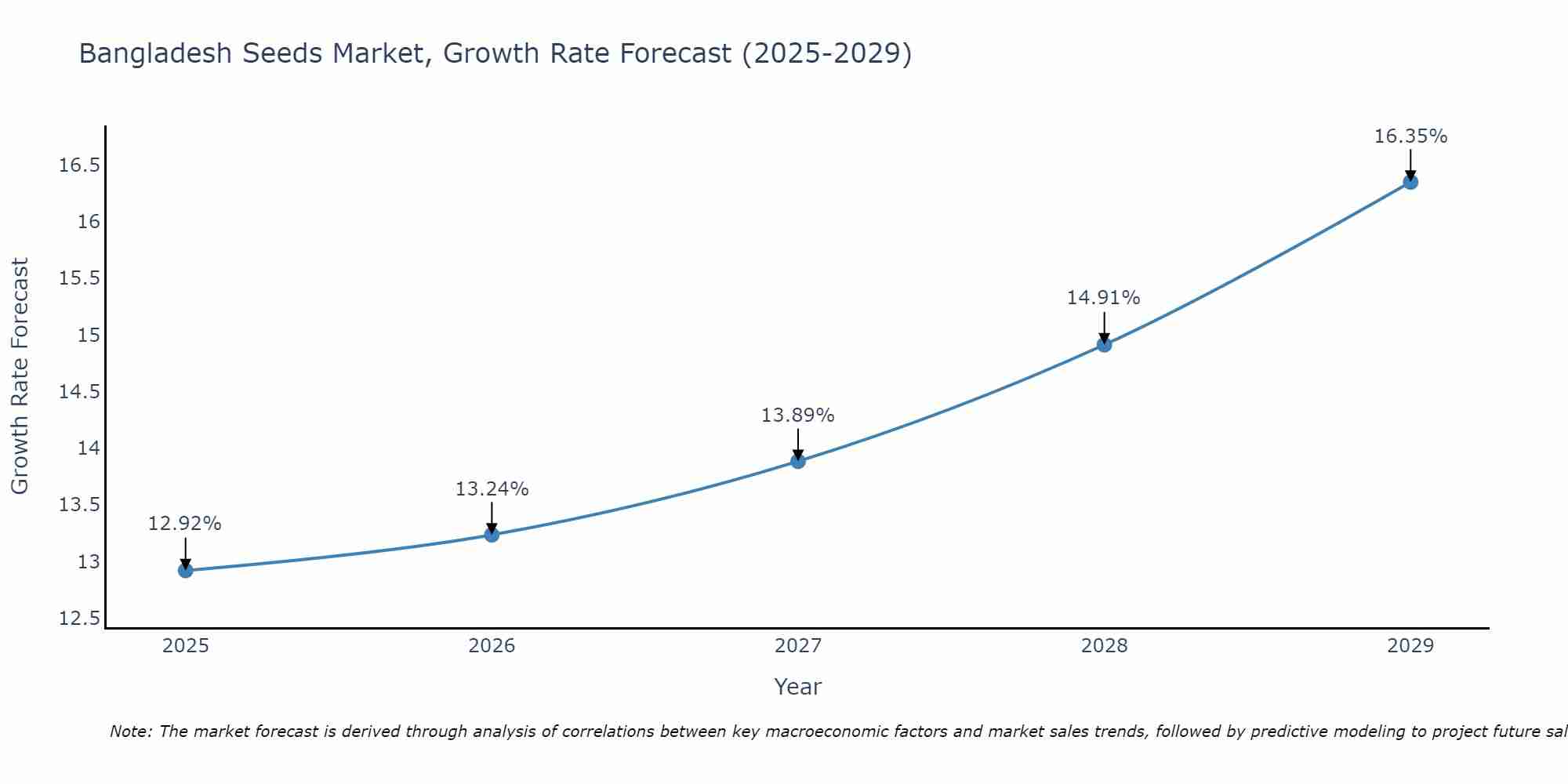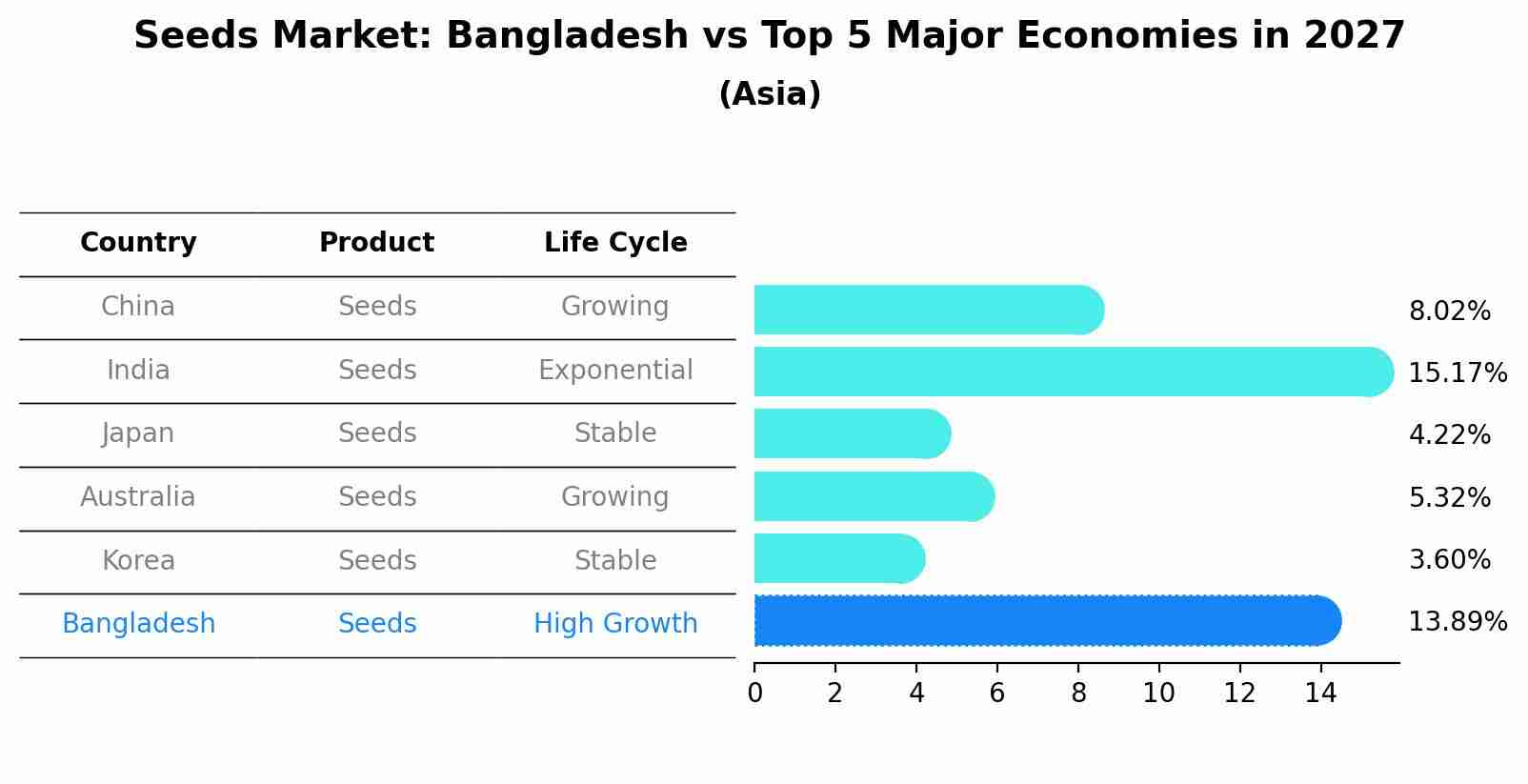Bangladesh Seeds Market (2025-2031) Outlook | Forecast, Companies, Share, Growth, Value, Analysis, Industry, Size, Trends & Revenue
| Product Code: ETC384692 | Publication Date: Aug 2022 | Updated Date: Jul 2025 | Product Type: Market Research Report | |
| Publisher: 6Wresearch | Author: Ravi Bhandari | No. of Pages: 75 | No. of Figures: 35 | No. of Tables: 20 |
Bangladesh Seeds Market Size Growth Rate
The Bangladesh Seeds Market is likely to experience consistent growth rate gains over the period 2025 to 2029. Commencing at 12.92% in 2025, growth builds up to 16.35% by 2029.

Seeds Market: Bangladesh vs Top 5 Major Economies in 2027 (Asia)
By 2027, the Seeds market in Bangladesh is anticipated to reach a growth rate of 13.89%, as part of an increasingly competitive Asia region, where China remains at the forefront, supported by India, Japan, Australia and South Korea, driving innovations and market adoption across sectors.

Bangladesh Seeds Market Synopsis
The Bangladesh seeds market is experiencing steady growth driven by increasing demand for high-yielding and disease-resistant crop varieties. Key players in the market are focusing on research and development to introduce new seed technologies and traits that enhance crop productivity. Major crops driving the seed market in Bangladesh include rice, wheat, maize, vegetables, and pulses. The government`s initiatives to promote modern agricultural practices and provide subsidies to farmers for purchasing quality seeds are further boosting market growth. The increasing adoption of hybrid seeds and genetically modified organisms (GMOs) is also contributing to the market expansion. However, challenges such as limited awareness among farmers about modern seed technologies and counterfeit seed products pose constraints to the market`s potential growth.
Bangladesh Seeds Market Trends
In the Bangladesh Seeds Market, there is a growing trend towards the adoption of hybrid and high-yielding varieties of seeds among farmers. This shift is driven by the increasing emphasis on improving agricultural productivity and ensuring food security in the country. Additionally, there is a rising demand for genetically modified (GM) seeds that offer traits such as pest resistance and increased yield potential. Farmers are also increasingly looking for seeds that are climate-resilient to cope with the challenges posed by climate change. Furthermore, there is a growing awareness about the importance of quality seeds and the use of certified seeds to ensure better crop performance. Overall, the market is witnessing a transformation towards modern seed technologies and practices to enhance agricultural output and sustainability.
Bangladesh Seeds Market Challenges
In the Bangladesh Seeds Market, a key challenge is the prevalence of counterfeit and low-quality seeds, which can significantly impact crop yields and farmer livelihoods. Lack of proper regulation and enforcement mechanisms make it difficult to control the spread of fake seeds in the market. Additionally, limited access to high-quality seeds, particularly for smallholder farmers, hinders agricultural productivity and sustainability. Climate change also poses a challenge, as farmers require seeds that are resilient to changing weather patterns. Furthermore, inadequate infrastructure for seed storage and distribution further complicates the situation, leading to post-harvest losses and reduced seed availability. Addressing these challenges will be crucial to enhancing the efficiency and competitiveness of the Bangladesh Seeds Market.
Bangladesh Seeds Market Investment Opportunities
The Bangladesh Seeds Market presents promising investment opportunities due to the country`s increasing focus on agricultural development and food security. With a growing population and rising demand for high-yielding and disease-resistant crops, there is a need for quality seeds in the market. Investing in the production, distribution, and research of seeds tailored to local conditions can be lucrative. Additionally, advancements in biotechnology and genetic engineering offer opportunities for developing innovative seed varieties. Collaborating with local farmers and agricultural organizations to promote the adoption of improved seeds can further enhance market growth. Overall, investing in the Bangladesh Seeds Market can be a strategic move to capitalize on the country`s agricultural sector`s growth potential.
Jordan Agar Market Government Policies
The Bangladesh government has implemented several policies to regulate and promote the seeds market in the country. These policies include the Seed Act of 1992, which governs the production, quality control, and marketing of seeds to ensure their quality and safety. The National Seed Board, established under this act, oversees the implementation of seed-related policies and regulations. Additionally, the government has introduced subsidy programs and incentives to encourage farmers to use high-quality seeds and adopt modern agricultural practices. Furthermore, efforts are being made to enhance research and development in the seed sector to promote the availability of improved seed varieties. Overall, these policies aim to boost agricultural productivity, improve food security, and support the growth of the seeds market in Bangladesh.
Bangladesh Seeds Market Future Outlook
The future outlook for the Bangladesh Seeds Market appears promising, driven by several factors such as increasing demand for high-quality seeds to improve agricultural productivity, government initiatives to promote modern farming practices, and growing awareness among farmers about the benefits of using certified seeds. The market is expected to witness steady growth due to a shift towards commercial farming, adoption of genetically modified seeds for higher yields, and rising investments in research and development of new seed varieties. Additionally, climate change and the need for drought-resistant and high-yielding seeds are likely to further fuel market growth. Overall, the Bangladesh Seeds Market is anticipated to expand, offering opportunities for domestic and international seed companies to capitalize on the evolving agricultural landscape in the country.
Key Highlights of the Report:
- Bangladesh Seeds Market Outlook
- Market Size of Bangladesh Seeds Market, 2024
- Forecast of Bangladesh Seeds Market, 2031
- Historical Data and Forecast of Bangladesh Seeds Revenues & Volume for the Period 2021 - 2031
- Bangladesh Seeds Market Trend Evolution
- Bangladesh Seeds Market Drivers and Challenges
- Bangladesh Seeds Price Trends
- Bangladesh Seeds Porter's Five Forces
- Bangladesh Seeds Industry Life Cycle
- Historical Data and Forecast of Bangladesh Seeds Market Revenues & Volume By Type for the Period 2021 - 2031
- Historical Data and Forecast of Bangladesh Seeds Market Revenues & Volume By Genetically Modified (GM) Seed for the Period 2021 - 2031
- Historical Data and Forecast of Bangladesh Seeds Market Revenues & Volume By Conventional Seed for the Period 2021 - 2031
- Historical Data and Forecast of Bangladesh Seeds Market Revenues & Volume By Crop for the Period 2021 - 2031
- Historical Data and Forecast of Bangladesh Seeds Market Revenues & Volume By Field Crops for the Period 2021 - 2031
- Historical Data and Forecast of Bangladesh Seeds Market Revenues & Volume By Fruit & Vegetable Crops for the Period 2021 - 2031
- Historical Data and Forecast of Bangladesh Seeds Market Revenues & Volume By Availability for the Period 2021 - 2031
- Historical Data and Forecast of Bangladesh Seeds Market Revenues & Volume By Commercial Seeds for the Period 2021 - 2031
- Historical Data and Forecast of Bangladesh Seeds Market Revenues & Volume By Saved Seeds for the Period 2021 - 2031
- Historical Data and Forecast of Bangladesh Seeds Market Revenues & Volume By Seed Treatment for the Period 2021 - 2031
- Historical Data and Forecast of Bangladesh Seeds Market Revenues & Volume By Treated for the Period 2021 - 2031
- Historical Data and Forecast of Bangladesh Seeds Market Revenues & Volume By Untreated for the Period 2021 - 2031
- Historical Data and Forecast of Bangladesh Seeds Market Revenues & Volume By Seed Trait for the Period 2021 - 2031
- Historical Data and Forecast of Bangladesh Seeds Market Revenues & Volume By Herbicide Tolerant for the Period 2021 - 2031
- Historical Data and Forecast of Bangladesh Seeds Market Revenues & Volume By Insecticide Resistant for the Period 2021 - 2031
- Historical Data and Forecast of Bangladesh Seeds Market Revenues & Volume By Other Stacked Traits for the Period 2021 - 2031
- Bangladesh Seeds Import Export Trade Statistics
- Market Opportunity Assessment By Type
- Market Opportunity Assessment By Crop
- Market Opportunity Assessment By Availability
- Market Opportunity Assessment By Seed Treatment
- Market Opportunity Assessment By Seed Trait
- Bangladesh Seeds Top Companies Market Share
- Bangladesh Seeds Competitive Benchmarking By Technical and Operational Parameters
- Bangladesh Seeds Company Profiles
- Bangladesh Seeds Key Strategic Recommendations
Frequently Asked Questions About the Market Study (FAQs):
- Single User License$ 1,995
- Department License$ 2,400
- Site License$ 3,120
- Global License$ 3,795
Search
Thought Leadership and Analyst Meet
Our Clients
Related Reports
- Canada Oil and Gas Market (2026-2032) | Share, Segmentation, Value, Industry, Trends, Forecast, Analysis, Size & Revenue, Growth, Competitive Landscape, Outlook, Companies
- Germany Breakfast Food Market (2026-2032) | Industry, Share, Growth, Size, Companies, Value, Analysis, Revenue, Trends, Forecast & Outlook
- Australia Briquette Market (2025-2031) | Growth, Size, Revenue, Forecast, Analysis, Trends, Value, Share, Industry & Companies
- Vietnam System Integrator Market (2025-2031) | Size, Companies, Analysis, Industry, Value, Forecast, Growth, Trends, Revenue & Share
- ASEAN and Thailand Brain Health Supplements Market (2025-2031) | Strategy, Consumer Insights, Analysis, Investment Trends, Opportunities, Growth, Size, Share, Industry, Revenue, Segments, Value, Segmentation, Supply, Forecast, Restraints, Outlook, Competition, Drivers, Trends, Demand, Pricing Analysis, Competitive, Strategic Insights, Companies, Challenges
- ASEAN Bearings Market (2025-2031) | Strategy, Consumer Insights, Analysis, Investment Trends, Opportunities, Growth, Size, Share, Industry, Revenue, Segments, Value, Segmentation, Supply, Forecast, Restraints, Outlook, Competition, Drivers, Trends, Demand, Pricing Analysis, Competitive, Strategic Insights, Companies, Challenges
- Europe Flooring Market (2025-2031) | Outlook, Share, Industry, Trends, Forecast, Companies, Revenue, Size, Analysis, Growth & Value
- Saudi Arabia Manlift Market (2025-2031) | Outlook, Size, Growth, Trends, Companies, Industry, Revenue, Value, Share, Forecast & Analysis
- Uganda Excavator, Crane, and Wheel Loaders Market (2025-2031) | Strategy, Consumer Insights, Analysis, Investment Trends, Opportunities, Growth, Size, Share, Industry, Revenue, Segments, Value, Segmentation, Supply, Forecast, Restraints, Outlook, Competition, Drivers, Trends, Demand, Pricing Analysis, Competitive, Strategic Insights, Companies, Challenges
- Rwanda Excavator, Crane, and Wheel Loaders Market (2025-2031) | Strategy, Consumer Insights, Analysis, Investment Trends, Opportunities, Growth, Size, Share, Industry, Revenue, Segments, Value, Segmentation, Supply, Forecast, Restraints, Outlook, Competition, Drivers, Trends, Demand, Pricing Analysis, Competitive, Strategic Insights, Companies, Challenges
Industry Events and Analyst Meet
Whitepaper
- Middle East & Africa Commercial Security Market Click here to view more.
- Middle East & Africa Fire Safety Systems & Equipment Market Click here to view more.
- GCC Drone Market Click here to view more.
- Middle East Lighting Fixture Market Click here to view more.
- GCC Physical & Perimeter Security Market Click here to view more.
6WResearch In News
- Doha a strategic location for EV manufacturing hub: IPA Qatar
- Demand for luxury TVs surging in the GCC, says Samsung
- Empowering Growth: The Thriving Journey of Bangladesh’s Cable Industry
- Demand for luxury TVs surging in the GCC, says Samsung
- Video call with a traditional healer? Once unthinkable, it’s now common in South Africa
- Intelligent Buildings To Smooth GCC’s Path To Net Zero


















